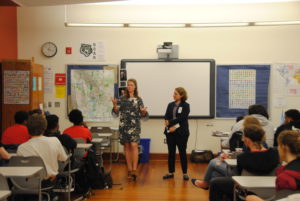By Sara Z. Kutchesfahani and Erin Connolly
 On Friday May 18, we went to Woodrow Wilson High School here in DC to talk to 28 juniors and seniors about nuclear non-proliferation. We only had 30 minutes, but we were asked at least 10-15 questions from a very engaged, informed, and passionate group of students. As a former professor, my teaching philosophy is always to start a class with a question to the group since, depending on the question, it often leads to good discussion.
On Friday May 18, we went to Woodrow Wilson High School here in DC to talk to 28 juniors and seniors about nuclear non-proliferation. We only had 30 minutes, but we were asked at least 10-15 questions from a very engaged, informed, and passionate group of students. As a former professor, my teaching philosophy is always to start a class with a question to the group since, depending on the question, it often leads to good discussion.
We started by explaining who we were and what we did at the Center, and kicked off the discussion with, “How many nuclear weapon states are there?” Answers ranged from 6-15, but we did hear a few 9s (the correct answer). This was clearly a class that did their homework about their guest speakers. This one question alone kicked off a very interesting and impressive range of questions.
These included:
- What is a nuclear weapon?
- What happens when a nuclear weapon gets dismantled?
- Does the Center have a position on the Iran Deal (JCPOA)?
- Will the Singapore meeting between President Trump and DPRK Leader Kim take place? What can we expect from it?
- Is the NPT an organization?
- Who oversees compliance with the NPT?
- How is the U.S. complying with their Article VI obligations under the NPT?
- Is there an organization that controls the spread of nuclear weapons?
- Is it illegal to have a nuclear weapon?
- If DPRK had the same amount of nuclear weapons as us, would they have used them against us?
- How do countries count their weapons in order to create stockpile estimates?
Our motivation for going into the classroom is part of the Center’s wider outreach mission: to educate and inform the public — in this case, our future voters — on nuclear issues. Our goal is to inform students such that they will be engaged and mobilized in nuclear issues so that their voices can be heard on Capitol Hill.
This effort is part of a larger project that Program Assistant Erin Connolly has worked on with Kate Hewitt, a Scoville Fellow at the Brookings Institute. In early May, Erin and Kate spoke to more than 1,100 high school and university students over four days the state of Washington. When they asked students how many countries had nuclear weapons, they heard answers ranging from no countries to too many countries, to all of them. While Erin and Kate focus on presenting across the many Manhattan Project sites throughout the United States, the Center is focusing its attention on the D.C. metro area. This approach allows a focused effort to educate the next generation of voters and policymakers.
The nuclear policy debate has largely left the public stage, and, as such, we are looking to reinvigorate this debate through education. As Erin and Kate said in Washington State, we are here to make nuclear policy more accessible in order to facilitate discussions and debates moving forward. The Center plans to reach as many DC public high schools as possible, and we hope that these visits will promote student interest and leadership on such an important national security issue.
